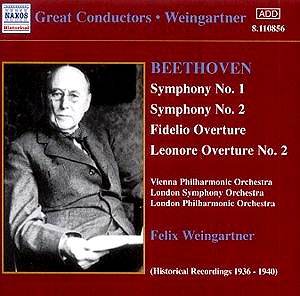I must confess that until now I don’t recall
having had an opportunity to hear Felix Weingartner (1863-1942)
conduct Beethoven. So I was fascinated to find Naxos issuing what
was, in fact, the first ever complete recorded traversal of the
Beethoven canon by one conductor. In contrast with the strategies
of today’s recording industry, I don’t believe a complete cycle
was envisaged at the time by EMI; it just evolved. This release
is the first in a series by Naxos.
Though his reputation has faded somewhat, Weingartner
was a much-respected figure in his day. As well as conducting
he composed a good deal though, as Ian Julier says in his most
informative note, "the dust was quick to settle on many of
his works after just the first series of performances." Weingartner’s
reputation was built chiefly on his conducting, and especially
on his performances of Beethoven. On the evidence of this release
I’m impressed with the energy and integrity of his performances
even if ensemble is not always perfect. It is worth also quoting
part of a comment of Neville Cardus which Ian Julier reproduces.
Cardus said of Weingartner that he belonged to "the cultured
epoch of music, the epoch of good manners and taste – and sound
scholarship." The contents of this CD serve to confirm that
judgement.
Coincidentally, I’ve also been listening recently
to a Naxos issue of Toscanini conducting Beethoven’s First
Symphony, a reading which was set down in London just six
days after Weingartner made the recording issued here. To my ears
Weingartner generally holds his performances on a slightly tighter
rein. I don’t mean by that to imply a preference for one conductor
over the other; both their approaches seem to work well. What
I thought was indisputable was that Toscanini gets even better
playing out of the BBC Symphony Orchestra than Weingartner obtains
from the Vienna players. My colleague, Jonathan Woolf, in reviewing
these same Weingartner performances, has pointed out that Weingartner’s
relations with the VPO were less than cordial at the time. This
may well have accounted for the results he gets from them though
I subsequently listened to his recordings of Beethoven’s Seventh
and Eighth, also made with the VPO in the same period, where the
playing was livelier and the ensemble crisper. Perhaps the recording
of the First just found players or conductor (or both) ever so
slightly below top form.
In this performance Weingartner, unlike Toscanini,
eschews the exposition repeat in both the first and second movements,
something which I regret. His first movement introduction is dignified
and the main allegro is clear-eyed and forward moving. The second
movement has an easy natural flow and I appreciated the idiomatic
phrasing though I feel that Toscanini’s version is even better.
The Menuetto is lithe and lively. Quite why Beethoven called the
movement a minuet I’m not sure when the tempo marking, allegro
molto e vivace and the musical material so clearly imply a
scherzo. The finale bubbles along gaily with plenty of the conductor’s
famous energy.
Most of the rest of the contents of this CD are
recordings made in London. The Second Symphony goes well.
From the outset I felt the tone of the LSO had more depth than
that of their Viennese counterparts and I don’t think this is
just down to the different recorded sound. The Londoners also
display greater unanimity in their playing. As in the First symphony
Weingartner’s direction of the opening allegro is clear and direct.
Characteristically, he omits the exposition repeat. Throughout
the movement the rhythms are well sprung and the vital sforzandi
are properly observed. In the larghetto I detected
greater warmth in the LSO winds than was the case with the VPO
wind section. In fact, there’s some good characterful playing
hereabouts by all concerned. The music is well phrased and I like
the way in which all the separate lines register - a characteristic
of all the performances. The scherzo is properly dashing and there’s
a puckish performance of the finale. Overall, this is a very successful,
sprightly performance.
All the overtures go well. In ‘Leonore’ No.
2 Weingartner conveys an excellent sense of suspense in the
introduction and there’s dramatic urgency in his handling of the
main allegro. The performance of ‘Prometheus’ is spruce
and alert and I thought the VPO were on tidier form than was the
case in the symphony.
There is a useful, interesting note by Ian Julier
and the transfers by Mark Obert-Thorn, which are taken from US
Columbia pressings, are good. Inevitably there’s some surface
noise but nothing that will distract from enjoyment of the music.
On my equipment I thought the transfer of the Second Symphony
reproduced particularly successfully.
On the evidence of this CD Felix Weingartner
was a far from inconsiderable conductor of Beethoven. I have much
enjoyed this disc and look forward to future releases in the series.
Recommended.
John Quinn

